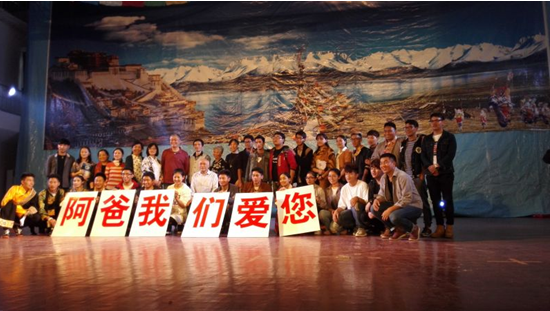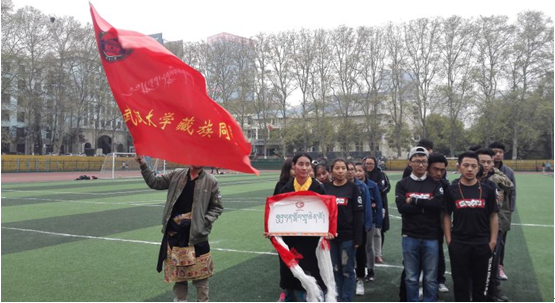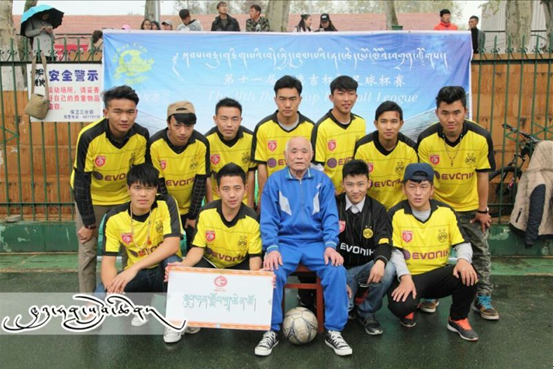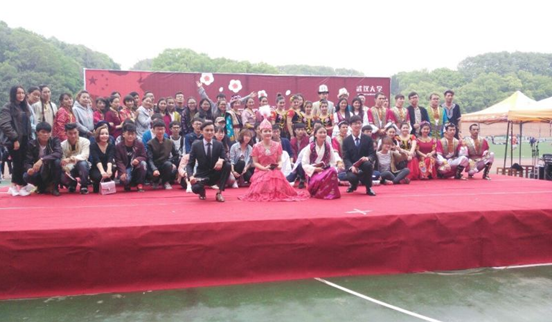On May 15, the “Dekyi Cup” graduation party, which isorganized by Tibetan students, was held in Wuhan University, with the participation of more than 200 undergraduates from major universities in Wuhan. Students opened their smart phone flashlights and waved their arms as they sung a Chinese song called Father for the elderly standing on the stage. They call him ‘Father Yang’ and it is his 80th birthday. Deeply moved by those students, Father Yang bows in four directions to all of them.
It never occurred to him that these children would make such a surprise for him. Chebu, a student of the School of Civil Engineering in WHU, offers a khatag (a piece of silk used as a greeting gift among Tibet) to Father Yang. After a while, there are already 30 pieces of khatag hanging around Yang’s neck. The birthday cake is placed on the table in front of him, with flickering candlelight delineating the number “80”. Tibetan students send their wishes through Chinese birthday songs and Tibetan benediction.
Father Yang, whose name is Yang Changlin, is famous among Tibetan students as “the father of all Tibetan students in Wuhan”. He is a retired teacher from the Department of Physical Education in WHU. When he was young, he ventured to Ali, the vertex of the Qinghai-Tibetan Plateau, where he met his wife -- Tsring Dekyi, a beautiful Tibetan lady. However, considering his health condition, he and Tsring Dekyi went back to Wuhan several years later. From then on, Father Yang and his wife have been taking care of each Tibetan student for over 30 years. As Chebu says, “there is no doubt that he is pretty much of fundamental importance in building the second home for us.”

Affectionate confession for Father Yang
“I’m longing to experience the outside world”
The first time I met Chebu, he was sitting opposite to me wearing an Adidas sports jacket with a sticking-out bangs haircut. He has an attractive voice and sun-tanned skin that oozes a sense of enthusiasm. Apart from his non-fluent Mandarin and the Tibet beat wound on his wrists, he is the same with students of Han nationality.
Ten years witnessed Chebu’s growth out of Tibet. In 2006, he left his hometown Nagqu near the Tanggula Mountain and started his middle school in Xi’an. He then attended high school in Tianjin. After the College Entrance Exam, he was admitted by Wuhan University as an engineering student. “The Longing for countless possibilities”, as Chebu put it, is the reason that he kept roving around different places.
On the first day of college, Chebu and his companions were picked up by the Tibetans Association (TA) that was led by Father Yang. There were 9 Tibetan freshmen that year and Chebu was the only male among them, which made him quite distinguishable. That's the reason why he took the role of the liaison at first.

TA members
Upon entering college, most strangers showed curiosity and surprise when they hear Chebu’s Tibetan name. Still, Chebu gradually gets accustomed to the campus life. He and his Han roommates are now great buddies. Apart from this, he engages himself in sports like soccer and basketball and has become the leading player.
Generally speaking, Tibetan education level is inferior to the average Chinese level. Each Tibetan student is confronted with the initial problem after they started their college life in WHU: academic study. Thondup Dora is a student from University of Tibet majoring in physics. To attend the exchange program between WHU and University of Tibet, he left Tibet for the first time and started the 2-year exchange study in WHU. While he was one of the most remarkable students in his former class, he nearly failed the exam of advanced mathematics in WHU. Fortunately, his teacher called other students on giving him more support and consideration, and he got help from the students who had higher grades.
Comparing with Chebu, Thondup feels it is much harder to adapt to his new life. “In Wuhan, it’s damp and hot all the time that I almost can’t bear it. And the food here is too spicy and salty,” said Thondup. He missed barley beer and zanba (roasted highland barley flour, a Tibetan staple) from home during his period of adjustment. Now, dressed in a black totem shirt with a buzz cut, Thondup has changed a lot after 2-year’s accommodation. However, he is still wearing the similar Tibet beats on his wrists. His limpid eyes still portray Tibetans’ unique artlessness.
“We are a family”
Though Tibetan students have their own social network with Han students, they still want to bond with other Tibetans and to feel they belong here in Wuhan. Under such circumstances, Father Yang and Wuhan Tibet-Supporting Department established the Tibetan Association (TA) in major universities in Wuhan. The TA in WHU consists of around 70 members with diverse grades and majors, including 14 exchange students and 4 graduate students.
TA organizes recreational activities every weekend like dining together and holding sports meetings. WHU Tibetan Association has its own soccer team and basketball team that would represent Wuhan University Tibetan to participate in the annual competition “Dekyi Cup”.

The soccer team achieved some excellent results
“Dekyi Cup”, initiated by Father Yang in honor of his late wife Tsring Dekyi, has a history of 11 years. It is now an annual grand activity that includes a sports meeting, welcoming party and graduation party for all the Tibetan students in Wuhan.
During the May Day holiday, the soccer team, including Chebu, followed Father Yang to take part in the “Dekyi Cup” soccer game. Chebu and the other players didn't dare to slack off during both the training and the race because they believed they represented WHU. Different from other universities, all the other TA members in WHU came to the scene and cheered up for the players.
It was also Father Yang who united everyone for graduation party this year. He helped renting the space, building the stage, and designing performances. He was busy behind and in front of the scene. Members of TA in WHU also prepared a unique show, an Indian dance called Ode to Joy For Mothers, for the party for two months.
Apart from “Dekyi Cup”, Tibetan New Year is of extreme significance for Tibetan students. On New Year’s Eve, they will gather to celebrate dressing in Tibetan cloaks. Kunkyi Drolma, a senior from School of Political Science and Public Administration, is a girl wearing dashing bomber jacket. She recalled that Tibetan students would prepare traditional dishes on the Eve. What impressed her most was that everyone would make dough balls out of the flour at Father Yang’s home. Inside the dough ball were various “representative of bliss”, such as glass and pepper. Some one might even attach pieces of paper with blessing or joke on it into the dough ball.
“I didn’t have much chance to go back home during high school, but now the policy alters the situation,” said Chebu. At the end of each semester, members of TA will gather around to take the Qinghai-Tibet Railway and travel all the way back to the plateau.
“Dedicated ourselves to ethnic communication”
There is a consensus among the TA members that they should spare no efforts to spread the Tibetan culture. Father Yang played an essential role in ethnic communication ever since he was a PE teacher in WHU. After his retirement, he still assists Tibetan students to hold communicational activities.
Back in 2013, Yang planned the first Tibetan Culture Festival, cooperating with Wuhan Tibet-Supporting Department, United Front Work Department and Student Affair Department of WHU. TA members made elaborated display boards with several themes including diet custom, music, literature, religion, Tibetan medicine, traveling and advancement of Tibet. In the evening, they held a spectacular show of Tibetan dance and music. “Tibetan Festival is held for all the students in WHU and is quite popular among students,” said Kunkyi Drolma. “Students of other ethnic groups have great passion to learn Tibetan culture, which is beyond our expectations.”
This year, Wuhan University intends to further unite all the ethnic groups by including more ethnic minorities into the “Ethnic Festival”. TA then becomes the bellwether in organizing students of Han nationality, Uygur ethnic group, Kazak ethnic group and Kirgiz ethnic group to establish a cultural feast in April in WHU. Because of the larger scale and a more formal organization, Chebu, as the director of this year’s “Ethnic Festival”, felt less burdened compared with the former heads.

The Cultural Feast rounded off successfully
Besides the “Tibetan Festival”, “Beauteous Hometown” is another major activity to present the Tibetan culture in WHU. After summer vacation, everyone in TA will obtain the task of bringing local specialties back to campus. “Most of us will take the barley beer, and we usually cook at Father Yang’s home,” said Kunkyi. One of the local specialties called ginseng rice is made of local dried ginseng with rice and special sauce. Another impressing cuisine is curry potato, which is quite different from the Indian one. Tibetans will add the famous Guru pepper that comes from Guru-a district of Tibet to produce the unforgettable flavor.
However, the majority of people are unaware of Tibet’s advancement. “Tibet has changed a lot,” said Kunkyi. “Thanks to national policy and the help from other ethnic groups, people now have their own ‘Tibetan villas’”. She said that she hope more people can go traveling to Tibet and to experience the culture.
When the interview came to an end, Chebu's cell phone rang. The ringtone was a traditional Tibetan folk song named Wait. And he said, “I will come back to Tibet, just like our father Yang. We all love this place.”
(Translated by Song Zihan, edited by Liu Yinglun, Mark & Hu Sijia)